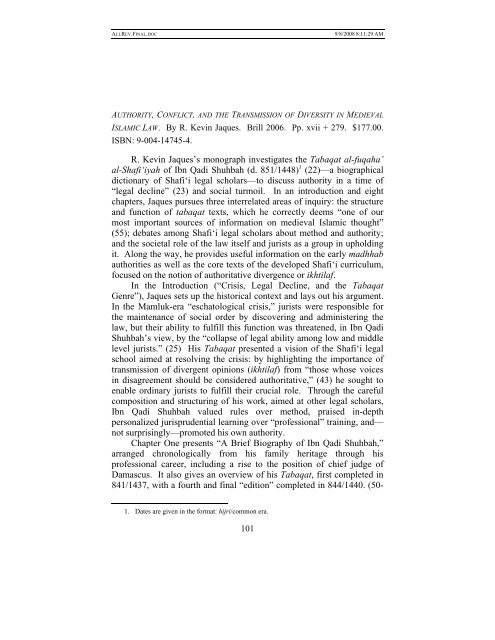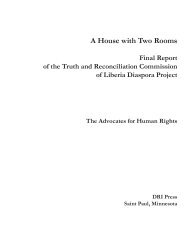R. Kevin Jaques's monograph investigates the Tabaqat al-fuqaha' al ...
R. Kevin Jaques's monograph investigates the Tabaqat al-fuqaha' al ...
R. Kevin Jaques's monograph investigates the Tabaqat al-fuqaha' al ...
Create successful ePaper yourself
Turn your PDF publications into a flip-book with our unique Google optimized e-Paper software.
ALI.REV.FINAL.DOC 9/8/2008 8:11:29 AM<br />
AUTHORITY, CONFLICT, AND THE TRANSMISSION OF DIVERSITY IN MEDIEVAL<br />
ISLAMIC LAW. By R. <strong>Kevin</strong> Jaques. Brill 2006. Pp. xvii + 279. $177.00.<br />
ISBN: 9-004-14745-4.<br />
R. <strong>Kevin</strong> Jaques’s <strong>monograph</strong> <strong>investigates</strong> <strong>the</strong> <strong>Tabaqat</strong> <strong>al</strong>-fuqaha’<br />
<strong>al</strong>-Shafi‘iyah of Ibn Qadi Shuhbah (d. 851/1448) 1 (22)—a biographic<strong>al</strong><br />
dictionary of Shafi‘i leg<strong>al</strong> scholars—to discuss authority in a time of<br />
“leg<strong>al</strong> decline” (23) and soci<strong>al</strong> turmoil. In an introduction and eight<br />
chapters, Jaques pursues three interrelated areas of inquiry: <strong>the</strong> structure<br />
and function of tabaqat texts, which he correctly deems “one of our<br />
most important sources of information on mediev<strong>al</strong> Islamic thought”<br />
(55); debates among Shafi‘i leg<strong>al</strong> scholars about method and authority;<br />
and <strong>the</strong> societ<strong>al</strong> role of <strong>the</strong> law itself and jurists as a group in upholding<br />
it. Along <strong>the</strong> way, he provides useful information on <strong>the</strong> early madhhab<br />
authorities as well as <strong>the</strong> core texts of <strong>the</strong> developed Shafi‘i curriculum,<br />
focused on <strong>the</strong> notion of authoritative divergence or ikhtilaf.<br />
In <strong>the</strong> Introduction (“Crisis, Leg<strong>al</strong> Decline, and <strong>the</strong> <strong>Tabaqat</strong><br />
Genre”), Jaques sets up <strong>the</strong> historic<strong>al</strong> context and lays out his argument.<br />
In <strong>the</strong> Mamluk-era “eschatologic<strong>al</strong> crisis,” jurists were responsible for<br />
<strong>the</strong> maintenance of soci<strong>al</strong> order by discovering and administering <strong>the</strong><br />
law, but <strong>the</strong>ir ability to fulfill this function was threatened, in Ibn Qadi<br />
Shuhbah’s view, by <strong>the</strong> “collapse of leg<strong>al</strong> ability among low and middle<br />
level jurists.” (25) His <strong>Tabaqat</strong> presented a vision of <strong>the</strong> Shafi‘i leg<strong>al</strong><br />
school aimed at resolving <strong>the</strong> crisis: by highlighting <strong>the</strong> importance of<br />
transmission of divergent opinions (ikhtilaf) from “those whose voices<br />
in disagreement should be considered authoritative,” (43) he sought to<br />
enable ordinary jurists to fulfill <strong>the</strong>ir cruci<strong>al</strong> role. Through <strong>the</strong> careful<br />
composition and structuring of his work, aimed at o<strong>the</strong>r leg<strong>al</strong> scholars,<br />
Ibn Qadi Shuhbah v<strong>al</strong>ued rules over method, praised in-depth<br />
person<strong>al</strong>ized jurisprudenti<strong>al</strong> learning over “profession<strong>al</strong>” training, and—<br />
not surprisingly—promoted his own authority.<br />
Chapter One presents “A Brief Biography of Ibn Qadi Shuhbah,”<br />
arranged chronologic<strong>al</strong>ly from his family heritage through his<br />
profession<strong>al</strong> career, including a rise to <strong>the</strong> position of chief judge of<br />
Damascus. It <strong>al</strong>so gives an overview of his <strong>Tabaqat</strong>, first completed in<br />
841/1437, with a fourth and fin<strong>al</strong> “edition” completed in 844/1440. (50-<br />
1. Dates are given in <strong>the</strong> format: hijri/common era.<br />
101
ALI.REV.FINAL.DOC 9/8/2008 8:11:29 AM<br />
102 JOURNAL OF LAW & RELIGION [Vol. XXIV<br />
51)<br />
Chapter Two (“A Brief Discursus on <strong>the</strong> Diversity of Source<br />
Materi<strong>al</strong> and Authori<strong>al</strong> Choice”) argues that Ibn Qadi Shuhbah, like <strong>al</strong>l<br />
tabaqat authors, “exercises control over <strong>the</strong> composition of biographic<strong>al</strong><br />
entries” (55) to make claims about particular networks of authority.<br />
Carefully an<strong>al</strong>yzing a series of notices including that of Ibn Qadi<br />
Shuhbah for <strong>the</strong> relatively undistinguished fourth/tenth-century Shafi‘i<br />
jurist <strong>al</strong>-Daraki, Jaques demonstrates that<br />
tabaqat writers such as Ibn Qadi Shuhbah were able to construct<br />
entries by combining received information and <strong>the</strong>n selectively<br />
mixing, removing, interpolating, and recasting passages, and thus<br />
<strong>al</strong>tering materi<strong>al</strong> to imply ideas that may not have been intended<br />
by <strong>the</strong>ir origin<strong>al</strong> authors. (89)<br />
Chapter Three (“Micro-Textu<strong>al</strong> Rhetoric<strong>al</strong> Strategies in Ibn Qadi<br />
Shuhbah’s Text: Authority, Death, and <strong>the</strong> Origins of Ikhtilaf in <strong>the</strong><br />
Shafi‘i Madhhab”) follows up on <strong>the</strong> insight that “most writers were<br />
careful and ra<strong>the</strong>r masterful manipulators of previous materi<strong>al</strong>.” (89)<br />
Jaques makes <strong>the</strong> case for treating biographic<strong>al</strong> dictionaries as complex<br />
texts ra<strong>the</strong>r than as transparent source materi<strong>al</strong> that merely reflects<br />
re<strong>al</strong>ity and preserves data. (Jaques’s keen awareness of <strong>the</strong> role of<br />
authori<strong>al</strong> choice in shaping any biographic<strong>al</strong> portrait must have made<br />
composing <strong>the</strong> previous chapter’s sketch of Ibn Qadi Shuhbah<br />
ch<strong>al</strong>lenging.) My only quibble here is that Jaques overstates <strong>the</strong><br />
origin<strong>al</strong>ity of his approach in comparison to how tabaqat texts are<br />
“typic<strong>al</strong>ly” treated. (113, similarly at 56) A 1977 essay by Fedwa M<strong>al</strong>ti-<br />
Douglas—which Jaques surprisingly does not cite—compares nearly<br />
two dozen biographic<strong>al</strong> notices for <strong>al</strong>-Khatib <strong>al</strong>-Baghdadi to very similar<br />
effect. 2 Even among historians of Islamic law, <strong>the</strong> notion that tabaqat<br />
entries were shaped by <strong>the</strong>ir author’s distinctive concerns is not novel. 3<br />
None<strong>the</strong>less, Jaques makes his point that “tabaqat texts must be used<br />
with caution” by intellectu<strong>al</strong> historians (113) as he illustrates <strong>the</strong><br />
“hypertextu<strong>al</strong>” relationships between entries using <strong>the</strong> notices of early<br />
Shafi‘i authorities <strong>al</strong>-Buwayti, <strong>al</strong>-Muzani and <strong>al</strong>-Rabi‘.<br />
In Chapter Four (“Macro-Textu<strong>al</strong> Rhetoric<strong>al</strong> Strategies: Trends in<br />
Learning as Indicators of Intellectu<strong>al</strong> Development”), Jaques shows how<br />
Ibn Qadi Shuhbah structures <strong>the</strong> <strong>Tabaqat</strong> to illuminate “<strong>the</strong> development<br />
2. Fedwa M<strong>al</strong>ti-Douglas, Controversy and its Effects in <strong>the</strong> Biographic<strong>al</strong> Tradition of <strong>al</strong>-<br />
Khatîb <strong>al</strong>-Baghdâdî, 96 Studia Islamica 115-131 (1977), republished in Fedwa M<strong>al</strong>ti-Douglas,<br />
Power, Margin<strong>al</strong>ity, and <strong>the</strong> Body in Mediev<strong>al</strong> Islam (Variorium Collected Stud. Series, Ashgate<br />
2001).<br />
3. See e.g. Nurit Tsafrir, Semi-Ḥanafīs and Ḥanafī Biographic<strong>al</strong> Sources, 84 Studia Islamica<br />
72 (1996).
ALI.REV.FINAL.DOC 9/8/2008 8:11:29 AM<br />
101] BOOK REVIEW 103<br />
of trends in intellectu<strong>al</strong> history.” (115) Ibn Qadi Shuhbah suggests a<br />
dearth of jurists able “to perform ijtihad and ijtihad-like operations.” 4<br />
(116) Since few jurists are capable of independently drawing rules from<br />
source texts, <strong>the</strong>y must learn doctrines from authorized figures and core<br />
madhhab texts. (120) This chapter <strong>al</strong>so explores Ibn Qadi Shuhbah’s<br />
authori<strong>al</strong> manipulation of different terms for education<strong>al</strong> relationships,<br />
mostly through selective omission of terminology present in earlier<br />
tabaqat texts, in order to convey his vision of <strong>the</strong>ir relative importance<br />
as methods of teaching or studying, <strong>the</strong>ir links to particular fields of<br />
learning, and <strong>the</strong>ir effect on <strong>the</strong> authority of individu<strong>al</strong> scholars. In this<br />
vein, Jaques points out that <strong>the</strong> terms bahth and bahatha—“used to<br />
indicate especi<strong>al</strong>ly high levels of achievement in learning”—appear<br />
rarely and “only in <strong>the</strong> biography of a scholar in Ibn Qadi Shuhbah’s<br />
intellectu<strong>al</strong> pedigree,” making clear <strong>the</strong>se men’s “superior credenti<strong>al</strong>s”<br />
and, by extension, his own. (134)<br />
Chapter Five (“The Development of Trends in <strong>the</strong> Transmission of<br />
‘Ilm”) treats ijtihad and ikhtilaf historic<strong>al</strong>ly. Since Ibn Qadi Shuhbah<br />
saw <strong>the</strong> ability to conduct ijtihad as limited, it became important to<br />
“assert <strong>the</strong> authority of substantive leg<strong>al</strong> texts containing divergent leg<strong>al</strong><br />
opinions”—in particular, those of <strong>al</strong>-Shirazi, <strong>al</strong>-Rafi‘i and <strong>al</strong>-Nawawi.<br />
(151) Substantive law (furu‘) contained—indeed, arose from <strong>the</strong><br />
interaction of—both “core doctrines on which authoritative jurists have<br />
agreed” (madhhab) and ikhtilaf, or “authoritative dissenting opinions.”<br />
(161) The crisis of leg<strong>al</strong> decline was not due to <strong>the</strong> disappearance of <strong>the</strong><br />
ability to perform ijtihad, which had <strong>al</strong>ways been fairly rare, but ra<strong>the</strong>r<br />
“a reduction in <strong>the</strong> intensive person<strong>al</strong> leg<strong>al</strong> training that [Ibn Qadi<br />
Shuhbah] prizes so highly,” (183) making <strong>the</strong> “existence and<br />
transmission of divergent substantive rules” (182) more vit<strong>al</strong> than ever.<br />
Chapter Six (“The Development of Leg<strong>al</strong> Methodologies and <strong>the</strong><br />
Decline of Leg<strong>al</strong> Thinking”) points out fur<strong>the</strong>r that <strong>the</strong> rise of usul <strong>al</strong>fiqh<br />
as a discipline and <strong>the</strong> greater speci<strong>al</strong>ization of jurists in that area<br />
coincided with a drop in <strong>the</strong> production of furu‘ even though, Ibn Qadi<br />
Shuhbah holds, “<strong>the</strong> re<strong>al</strong> object of <strong>the</strong> leg<strong>al</strong> profession” was “<strong>the</strong> rules<br />
<strong>the</strong>mselves.” (189) Shafi‘i’s basic method (which Jaques c<strong>al</strong>ls “ra<strong>the</strong>r<br />
simplistic” (192) and “rudimentary or practic<strong>al</strong>” (199)) was important,<br />
but training focused on speculative methodologies and “expedient<br />
sciences”—that is, ancillary disciplines such as variant Qur’anic<br />
readings, history, lexicography, and so forth—correlated with “<strong>the</strong> rise<br />
of deficient jurists” and “an end to speci<strong>al</strong>izations in fiqh, which were<br />
4. See <strong>al</strong>so fig. 5.4 at 165, one of <strong>the</strong> most useful of <strong>the</strong> book’s numerous charts.
ALI.REV.FINAL.DOC 9/8/2008 8:11:29 AM<br />
104 JOURNAL OF LAW & RELIGION [Vol. XXIV<br />
necessary for origin<strong>al</strong> leg<strong>al</strong> discovery to continue.” (219)<br />
Chapter Seven (“Curatives for <strong>the</strong> Decline of Law”) presents <strong>the</strong><br />
culmination of Jaques’s argument: Ibn Qadi Shuhbah sees key ikhtilaf<br />
texts as vit<strong>al</strong> for jurists with deficient training to maintain <strong>the</strong> effective<br />
“functioning of <strong>the</strong> law” (226) necessary to curb soci<strong>al</strong> chaos. These<br />
texts, mostly centering on divergent opinions attributed to <strong>al</strong>-Muzani and<br />
<strong>al</strong>-Ghaz<strong>al</strong>i, “expanded <strong>the</strong> range of opinions from which jurists could<br />
draw.” (233) Although <strong>the</strong>y seemed to present divergent opinions, <strong>the</strong>y<br />
were linked through Ibn Qadi Shuhbah’s construction of educative<br />
lineages to <strong>al</strong>-Shafi‘i himself, thus guaranteeing <strong>the</strong>ir authoritativeness.<br />
The eighth and fin<strong>al</strong> chapter (“Ibn Qadi Shuhbah, Crisis, and His<br />
Authority”) shows how <strong>the</strong> <strong>Tabaqat</strong> presents different elements of Ibn<br />
Qadi Shuhbah’s “intellectu<strong>al</strong> pedigree” as well as famili<strong>al</strong> lineage “to<br />
present its author as an heir to <strong>the</strong> great scholars of <strong>the</strong> past and”—<br />
neatly bringing us back to <strong>the</strong> moment of crisis with which <strong>the</strong> study<br />
opened—“as a leader uniquely qu<strong>al</strong>ified to lead <strong>the</strong> Syrian Shafi‘i<br />
community in its hour of peril.” (258)<br />
In closing, a word about <strong>the</strong> writing. The book contains a number<br />
of expository digressions. Some work well, including <strong>the</strong> discussion of<br />
an o<strong>the</strong>rwise unimportant government crisis. (94-97) Explaining <strong>the</strong><br />
context and references for a seemingly offhand remark from an entry<br />
devoted to <strong>the</strong> fifteenth-century jurist Ibn <strong>al</strong>-Barizi, Jaques shows how<br />
“in <strong>the</strong> space of just fifteen words” (97) Ibn Qadi Shuhbah c<strong>al</strong>ls up a<br />
we<strong>al</strong>th of associative detail and networks of meaning. O<strong>the</strong>r<br />
digressions, though, affect <strong>the</strong> flow of argument and consistency of tone<br />
to no apparent purpose. Speci<strong>al</strong>ists will not need <strong>the</strong> extended<br />
introductory discussion of usul <strong>al</strong>-fiqh (152-158) and readers who might<br />
find it useful are unlikely to appreciate this study’s origin<strong>al</strong><br />
contributions. Fin<strong>al</strong>ly, and a reflection of Brill’s lamentable decision to<br />
forgo copyediting control, grammatic<strong>al</strong> and typographic<strong>al</strong> errors abound.<br />
Occasion<strong>al</strong> mistakes in published works are inevitable and <strong>al</strong>l authors<br />
rue <strong>the</strong>m, but <strong>the</strong>re are enough here to be distracting to readers,<br />
beginning with <strong>the</strong> use of “affect” for “effect” in <strong>the</strong> third sentence (1)<br />
and continuing apace throughout <strong>the</strong> book.<br />
These minor points notwithstanding, Jaques’s study is an important<br />
contribution to scholarship. Like Ibn Qadi Shuhbah’s <strong>Tabaqat</strong>, it is a<br />
complex text that builds its argument in layers and rewards careful<br />
reading. It should be acquired by libraries and read by speci<strong>al</strong>ists in<br />
tabaqat literature, Mamluk history, and Islamic jurisprudence,<br />
particularly those with interests in <strong>the</strong> Shafi‘i madhhab.
ALI.REV.FINAL.DOC 9/8/2008 8:11:29 AM<br />
101] BOOK REVIEW 105<br />
Kecia Ali *<br />
* Assistant Professor, Department of Religion, Boston University, Boston, Massachusetts.

















